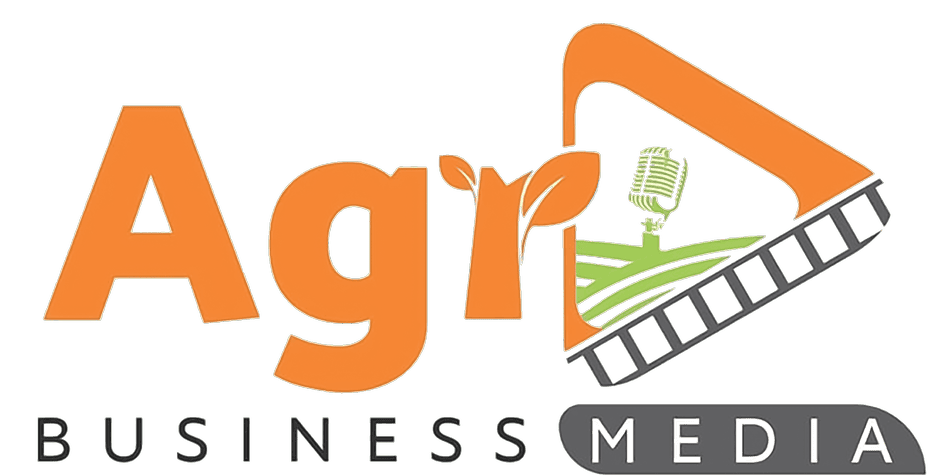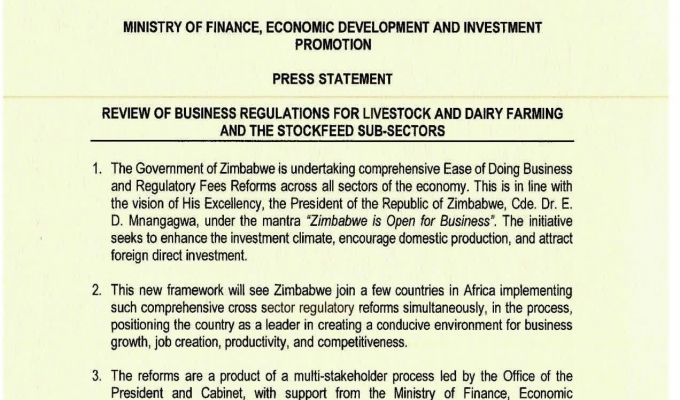HARARE, ZIMBABWE – In a landmark move set to bring major relief to farmers and agribusinesses, the Government of Zimbabwe has announced a comprehensive overhaul of business regulations, drastically cutting and in some cases eliminating a wide range of fees and permits burdening the livestock, dairy, and stockfeed sub-sectors.
The sweeping reforms, detailed in a press statement from the Minister of Finance, Economic Development and Investment Promotion, Hon. Prof. Mthuli Ncube, are the first phase of a cross-sectoral initiative aimed at enhancing the Ease of Doing Business, stimulating investment, and aligning with President Emmerson Mnangagwa’s “Zimbabwe is Open for Business” mantra.
The move directly addresses long-standing complaints from the agricultural community about excessive bureaucracy and high compliance costs, which the government acknowledged had constrained the sector. Previously, a single dairy farmer could require up to 23 different permits from 10 separate departments, creating a heavy financial and administrative burden, especially for smallholders.
Key Highlights of the Reforms:
The new framework introduces significant changes designed to lower operational costs, simplify compliance, and promote growth. Key reductions and abolishments include:
Farm & Processor Registration Fees:
-
Agriculture Marketing Authority (AMA) farm registration fees cut to a nominal $1 flat fee.
-
Farm Registration Certificates for small and medium-scale farmers have been abolished.
-
Dairy processor registration reduced from $350 annually to a one-time fee of $50.
-
Feed manufacturing registration cut from the
150−250 range to a $20 flat fee.
Trade and Compliance Costs:
-
Export registration for dairy products has been slashed from $900 to just $10.
-
Meat export registration is reduced from $500 to $100 annually.
-
The Consignment-Based Conformity Assessment (CBCA) Certificate has been abolished.
-
The AMA livestock development levy has been scrapped entirely.
-
Cattle levy and biosafety permit fees have also been scrapped.
Permits and Environmental Levies:
-
Livestock movement clearance reduced by 50% from $10 to $5 per herd.
-
Local authority health certificates cut from $300 to $100 annually.
-
Environmental Management Agency (EMA) effluent and waste disposal fees for dairy farmers are down from $800 to $100 annually.
-
The National Biotechnology Authority import compliance licence ($1,700) has been abolished.
Broader Economic Impact and Vision 2030
According to the statement, these measures are designed to achieve several strategic objectives:
-
Lower the cost of doing business, especially for Small and Medium-sized Enterprises (SMEs).
-
Encourage investment and growth in high-potential value chains.
-
Create jobs and stimulate rural development.
-
Improve competitiveness and formalisation across the agricultural sector.
This agricultural-focused reform is the first step, with subsequent phases planned to extend to the Tourism, Transport, Retail, and other strategic sectors. The initiative is part of Zimbabwe's broader goal to achieve the status of an Upper Middle-Income Society by 2030.
The Minister’s statement, dated 10 September 2025, assures stakeholders that all future regulations will undergo a stringent Regulatory Impact Assessment under the supervision of the Office of the President and Cabinet to ensure they do not undermine investment and economic growth.
This decisive action by the government is expected to be widely welcomed by farmers, processors, and investors, potentially unlocking significant new growth and efficiency in Zimbabwe's cornerstone agricultural industry.

